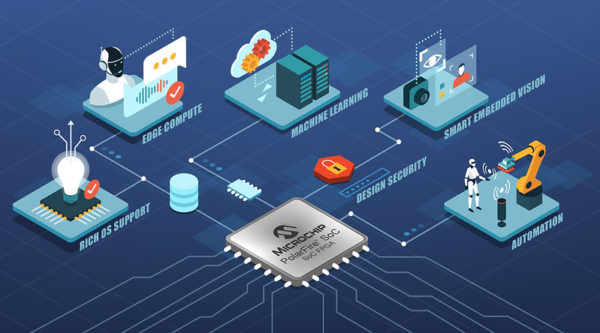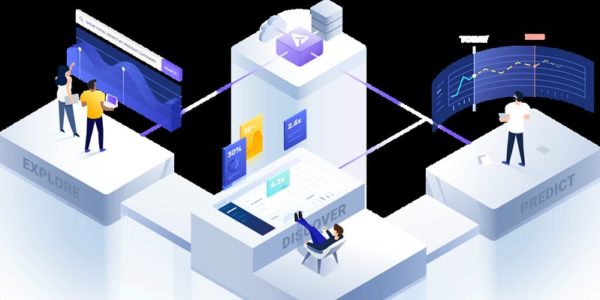With increasing subjectivity to AI capabilities, it is changing the facet of enterprise software and exploring new avenues. Things that were out of vision are now possible with Artificial Intelligence technology. Let’s see how AI is bringing about the change!
Enterprise software is undergoing some significant transformations in its history after techies got familiar with Artificial Intelligence definition and its incorporation. In the current scenario, one-third of the workload of companies is run on clouds. And therefore, ‘Cloud Computing’ is turning out to be a default model to accelerate application deployment.
Various types of Artificial Intelligence are helping businesses to come in handy on mobile devices as most customers prefer it for personal or business tasks. AI is gradually developing a new high-tech era, and all organisations can now modernize their application systems by following these trends. As per the Gartner predictions for 2021, 40% of the latest enterprise software developed by service providers would comply with AI capabilities!
Implementing AI for Enterprise Applications
It’s time to explore the Artificial Intelligence future and slowly become a part of modern applications!
1. Implementing conversational AI for managing data analytics consumption
Data analytics is a critical task and quite time-taking to sift multiple business dashboards and secure relevant data. It is possible to overcome these limitations through AI-еnabled virtual assistants. It can also lead to better integration through business intelligence apps. Recent Artificial Intelligence news claimed that virtual assistants could connect better with the users through NLP Technology.
Taking deep insights into the multiple tools and dashboards is now possible with AI efficacy. Artificial Intelligence has led to better business handling for on-field employees who need data handy without digging the piles of information.
2. Complete Enterprise IT security with Artificial Intelligence
After the pandemic, the trend of remote working is at an all-time high across the world. In the wake of this, IT decision-making is coming at the front foot, and you can not also ignore the cyberattack threats.
Artificial Intelligence, a modern approach, helps in tactfully handling every aspect of the IT infrastructure. And most organizations scramble to integrate applications powered with AI. It aids in the timely detection of the vulnerabilities and potential threats registered in the IT system. Such tools also comprise ML techniques that spot anomalies from user activities, network traffic, and emails. With this, they can sense the potential attack as well and follow the steps for its effective mitigation.

3. Changing IT Via AIOps
AIOps is a recent variation to the DevOps that infuses machine learning (ML) algorithms for getting insights into IT operative data and overall improvisation and optimization of operations. The motive of DevOps is to simplify and automate the IT operations while the AIOps take a step more and extract data that is imperative to schedule IT activities.
A quick glimpse at the Artificial Intelligence definition could make you familiar with the probabilities of defining business in a better manner. Several times, Artificial Intelligence can also take up an obligatory action in relevance to the insights that enable IT personnel to handle larger IT environments in the best possible ways.
4. Smarter Intranet with effective incorporation of Artificial Intelligence
Don’t you think it is necessary to make your digital workplace smarter? Absolutely yes, and apt content management triggers the need for accessing information, social networking and employee communication. Cognitive enterprise search also enables the users to explore results based on locations, interests, and the activities relevant to past searches.
5. Metadata Management
The next arena where the Artificial Intelligence future seems bright is automated metadata management. Most enterprises are making use of Artificial Intelligence bots for the automation of metadata generation. It also includes classification and management of the top quality taxonomy recommendation as well as data-tagging. Due to this, the organization could optimize the unstructured data and manage it in a better way.
6. Personalised Content Recommendations
Artificial Intelligence also supports the intranet to cut down on clutter and accelerate the customized content recommendations for the users depending on the job profiles, interests, and locations. The proper use of Artificial Intelligence also helps to analyse the user persons and suggest the apt subject matter to the experts. All of this, including AI-powered analytics, supports analysing and managing the user data.

7. Artificial Intelligence and CRM Combination
The benefits of Artificial Intelligence for managing and supporting CRM software are exceptional. There are a few reasons due to which you can contemplate the AI-Driven software. It includes the automation of data entry, simplifying the data updating processes, and allowing users to access all details quickly.
Besides, AI capabilities also foster the sending of personalized updates on an automated mode. It also predicts the potential customer behaviour, so that customers get learnings from the past decisions and result in value-based sales. Overall, the AI incorporation helps in tactful analysis of customer sentiments and aids in making predictions for their future behaviours.
8. Automated Segmentation of customer via Artificial Intelligence
AI also helps in the automated segmentation of customers in the groups so that businesses can hit the right set of audiences at any given time. Next up is price optimization, where Artificial Intelligence helps in analysing past client data for making predictions on exact pricing and discount rates to fix sales deals.
9. Optimising Supply Chain Management with Artificial Intelligence
Many enterprises are shifting their focus to Artificial Intelligence and investing hugely in AI-Powered supply chain management applications. This aids in anticipation of potential issues, reduction of costs, and overall recovery from the supply disruption. Types of Artificial Intelligence leverage the analytics of the enterprise and help in creating a resilient supply chain. Other aspects of such an AI are the detection of stock situation, stock visibility, and supplier risk analysis.
10. Helps in Artificial Intelligence-based vendor billing
Artificial Intelligence can skillfully manage the financial operations within the enterprise. Taking a step away from the conventional Optical Character Recognition (OCR) system can help in handling the invoice management software for fetching critical data.
Final Words
Artificial Intelligence’s future is prominent in the overall transformation of enterprise software. No one can deny the role of AI-based apps and their efficacy in improving the speed, efficiency, and quality within organizations. It is indeed overwhelming to fetch desirable results by infusing types of Artificial Intelligence systems in it. Pep up for your Artificial Intelligence journey, and get ready for the big start! Do share your inputs or experience with Artificial Intelligence systems.
Did you recently have market research for enterprise software? Most vendors these days claim their product is being equipped with (Artificial Intelligence) AI capabilities. Take a glimpse at the top slot sites to know how AI is changing the market scenario drastically!

